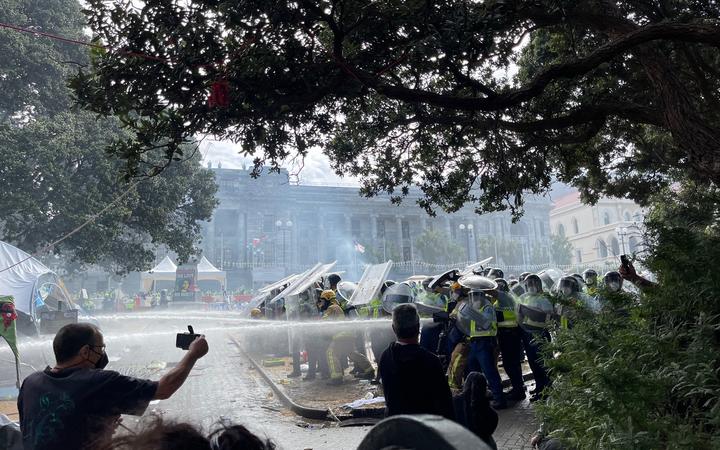Covid Kahu initially refuses to come to the door or even talk to me. He's become house bound, his nose and every other part of him staying within limits. I tell him to get James as I want my food containers back. By the time I leave, and he's eaten some leftovers, he's a bit more grateful and cheerful.
Sharyn tricycles over on Saturday but she's tipped over on the way, hurt her foot and won't stay. I'm worried about her and offer to drive her home but she's adamant she wants to get herself and her tricycle back to base. In the evening I visit Chris who unexpectedly cooks. We ring Sherry who is comfortable with just the two of us and comes over. She needs to work and is afraid of getting Covid but trusts our germs. I wouldn't trust me; I'm working in the pea soup of Covid. With a mask but a very ineffectual one.
We meet at OGB in the Square on Sunday. Someone has made a long overdue start on Cathedral earthquake repairs. Hope there's not another big earthquake for a while but the delay has been shameful. Jorge gets a bit tetchy about the book case in his room, touched off by a plug not working and the lack of space he has beside his bed to plug things in. I'm prepared to put my foot down, having had flatmates for whom I have compromised too much in years past. It's my house and I'll sort it how I want. Bertie goes to a lot of trouble and gets a wooden strip up so the book case is straight and stable. I unpack some books at long last.
It's another grey week of grey swims. I'm longing for long overdue autumn sunshine. Everywhere else in New Zealand seems to be getting it. I've got blue sky envy. To boot, there are cool winds. But my tomatoes keep producing and Thursday drinks keep us sane. Albeit with thick coats.
The Covid curve is flattening nationwide but climbing in Canterbury. We have been later getting cases and have a long way to catch up with Auckland.
Director-General of Health Dr Ashley Bloomfield says there are 18,423 new community cases of COVID-19, 913 people in hospital and 11 new deaths.
It comes ahead of changes to the traffic light system on Friday night, including the removal of outdoor gathering limits and the use of QR code scanning.
2:05pm - It has just been announced that the MIQ booking system is being decommissioned as New Zealand's borders reopen. Here's what MIQ had to say:
With New Zealand now reopening to the world and MIQ winding down, the MIQ voucher booking system is being decommissioned, says Head of MIQ Chris Bunny.
"This is a natural next step in the scaling back of our operations. With fewer people now needing to come into MIQ, the voucher booking system just isn’t needed anymore," he said.
"Most travellers entering New Zealand will be able to self-test on arrival. MIQ will only be used in limited circumstances, — for example, for some maritime and international air crew. In those circumstances, the voucher booking system will no longer be necessary," he said
"Without vouchers we also no longer need a system for emergency allocations of vouchers or time sensitive travel allocations, so those systems are being decommissioned too. From Friday 25 March 2022, MBIE will no longer accept any new emergency allocation or time sensitive travel applications.
At its height, the equivalent of Kaiapoi’s population passed through managed isolation each month: 12,600 people in 9000 rooms every 28 days. Mr Bunny says MIQ played a critical role - preventing Covid becoming widespread through communities while giving people a way to return home.
Meanwhile in Ukraine
It's been one month since Russia invaded Ukraine on Feb. 24. As Thursday draws to a close in Kyiv and in Moscow, here are its key developments:
Russian troops have been unable to advance on the capital of Kyiv. To the east, Ukrainian forces pushed back some Russian soldiers; to the northwest, Russian forces are digging in to defensive positions, according to the Pentagon. In southern Ukraine, Russian troops had overrun Kherson and Melitopol, but face civilian protests. The key port city of Mariupol remains under siege. Russia's military continues to rely on artillery and bombs, including long-range attacks from ships.
The war has displaced more than half of Ukraine's children and a quarter of the overall Ukrainian population. Some 2.5 million children have had to relocate inside Ukraine, and more than 1.8 million more have crossed into other countries as refugees, according to UNICEF.
Almost 3.7 million people have fled Ukraine, according to the U.N. refugee agency. The United States pledged to accept up to 100,000 Ukrainians and other displaced people fleeing the conflict in Ukraine.








































.jpg)



















